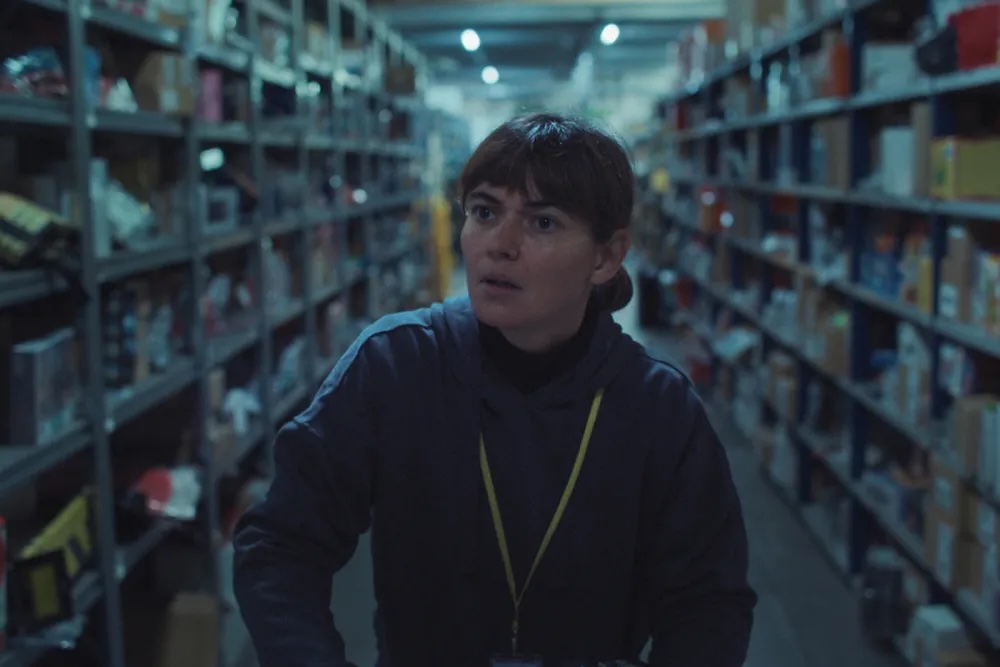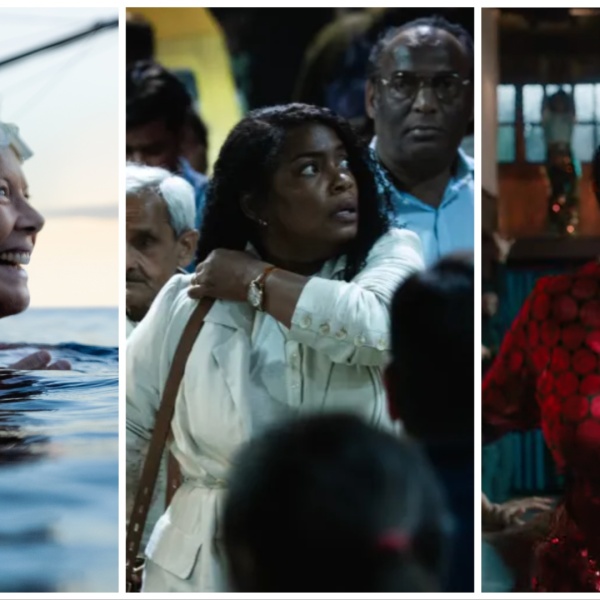
This debut feature from Portuguese director, Laura Carreira, produced by the company Ken Loach co-founded, Sixteen Films, is far better than anything living-political-legend Loach made during the final innings of his career. Using a social realism that is all the more powerful for its restraint, Carreira avoids wild swings and contrived speeches, and trusts the audience to be swept up by a devastating performance of a woman being hollowed out from within by inhumane working conditions.
We are dropped in with Aurora (Joana Santos) as she shows up to work as a packer at a Scottish factory. Carreira has a docu-realistic eye for setting and a dramatist’s instinct for pacing and mood. The pitter-patter of workers footsteps, the squeaking of a metal turnstile gate, the beeping of Aurora’s scanner — a tool of her trade — form a rhythm so that there is an assured quality that marks the film as a work by someone who is has not fallen into the trap of thinking that social realism means no production values. Instantly, there is a charge to events despite the fact that the film is painstakingly fashioned from plausible locations and scenes are allowed to breathe.
That these production values are compelling yet non-intrusive make them the perfect mirror for Aurora, a woman so polite, so capable, so ready to smile that we do not realize that her soul is evaporating.
She has it together, relatively speaking, or so it initially seems. She has a Portuguese friend who drives her home from work. She has the resources to eat pasta at night where some flatmates eat cereal. She is so fast at her job that she is awarded a special bonus — a chocolate bar from an assorted box. (“Good choice,” her boyish superior says.) Aurora’s colleagues, co-workers and those in parallel jobs are painted as decent and pleasant people, understandably preoccupied by their own targets and margins. Carreira is not interested in vilifying individuals but in teasing out the inhumanity of working conditions that grind people down little by little. Like a frog being boiled alive in water, Aurora has yet to notice the gravity of her situation.
Two friendly men cause her to look at her life with new eyes. The first is a co-worker she meets at the canteen. A gorgeously directed and acted scene unearths the delicate delight of two shy people realizing that they are connecting. Aurora and the man both light up as they discuss the relative merits of their lunches and what they like to do outside of work. The tension of smalltalk riven with pregnant pauses breaks into a real rapport after he cracks a joke that Aurora will later recycle to try to save herself from social abjection. The warmth of this meeting sets up the classic expectation that romance may be brewing. Fate has other plans in store, plans are so casually shocking that the film shifts into a more urgent register but so tastefully handled that there is no sense of emotional manipulation.
This is the first glimmer of how deep the layers go in Joana Santos’s performance. Her careworn beauty holds the camera rapt even while silently going about her job in a manner that plays as naturally absorbing. She channels a hesitant, insecure person who takes a measure of herself internally before speaking. When something consequential happens to Aurora that a more assured person would instinctively react to, she freezes, not trusting her true expression, strangling it inside and then letting it go. She is someone who has begun closing up shop on her feelings, while leaving the lights on in her eyes and smile. This warmth is all she has left to trade on and she desperately needs someone for whom that is enough.
That someone, she thinks, might exist in the form of her newest flatmate at the hostel, a Polish man with a van named Viktor (Robert Rutanic). He brings an easy charm, a way around the kitchen and — something that induces a painful awakening in Aurora — a coterie of friends primed to hang out. Before Viktor’s arrival, sitting alone in the kitchen eating pasta and playing on her phone passed as an evening’s entertainment. By contrast with Viktor’s social calendar, it now feels like entering the void.
An ongoing pleasure and relief in “On Falling” is that Carreria does not twist the knife by having people mistreat Aurora in cartoonish ways. Indeed, Viktor is a deeply kind person. By now Santos’s heartrendingly interior performance of Aurora is so established that every social interaction feels incredibly high-stakes — while there is a huge dramatic irony as the person on the other end of the casual conversation does not realize how badly she needs them to accept her. Santos and Carreira have fashioned a character that offers the audience the intimacy of her solitude.
An unexpected expense spins Aurora’s world off its axis and she is too aware that those around her live in identical states of precarity to ask for help. Every detail of her life has been meticulously coded into the production design. The food that she eats switches from hot meals to sandwiches to water with sachets of sugar tipped into it. Carreira makes a virtue out of Aurora’s lack of articulacy, letting the increased desperation of her situation express itself through changes to her routine. Santos shows that suffering from economic instability also erodes confidence and, in the end, our notion of who we are. Aurora is breaking down and nobody is noticing. The only tells are dips in performance at work.
Carriera understands that to make a small and quiet human drama land like an aneurysm nothing can ring false. From the clean, spare, anonymous hostel where Aurora lives to the curious range of products dotted across the Amazon-like factory floor to the sight of a company man dressed in a marine animal costume for a party, there is a refined vision at work here and locations have been scouted with an eye for both accuracy and color. So convincing are the settings and so intentional are the props that meaning sings out when Aurora decides to substitute one order for another. “On Falling” paints with the stuff of life.
Each scene is a miniature marvel — a scene in the chip shop conveys loneliness purely through blocking — and the cumulative emotional stakes only stack up as Carriera directs her own screenplay, which possesses no excess. She has a complex understanding of the interplay between what an emotional breakdown feels like and how it is filtered through a social mask. The sophistication that has gone into crafting Aurora’s psyche is phenomenal and the mapping of this onto a specific type of labor is what makes “On Falling” a masterful calling card.
Grade: A-
“On Falling” premiered at the 2024 Toronto International Film Festival. It is currently seeking U.S. distribution.
Want to stay up to date on IndieWire’s film reviews and critical thoughts? Subscribe here to our newly launched newsletter, In Review by David Ehrlich, in which our Chief Film Critic and Head Reviews Editor rounds up the best reviews, streaming picks, and offers some new musings, all only available to subscribers.




